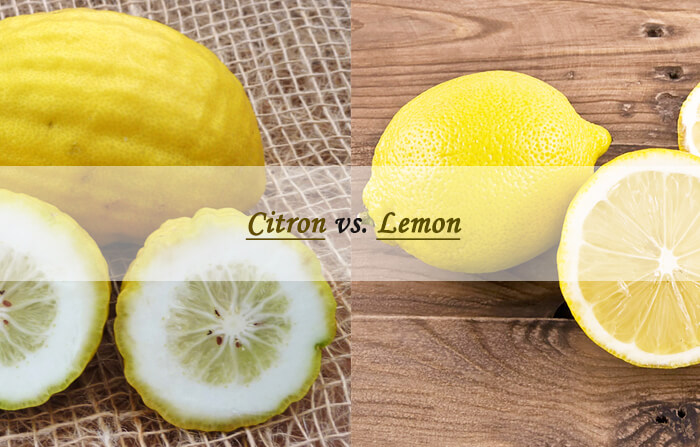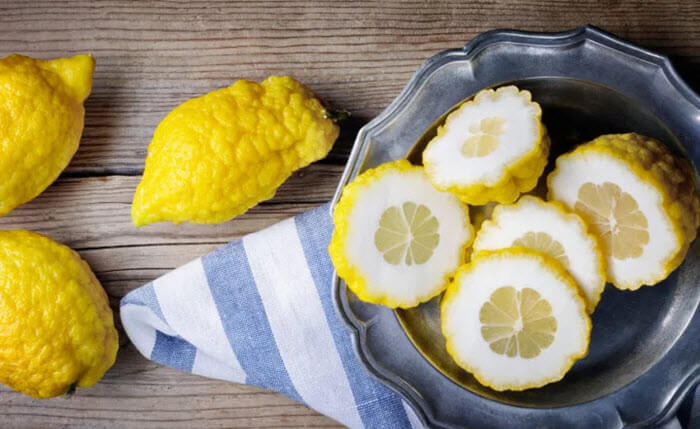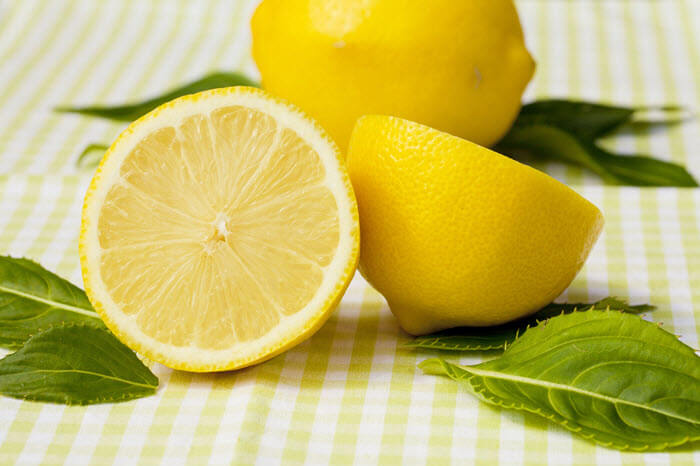When you first think of citrons and lemons, you might think they are similar because both are in the citrus family.
But their look, taste, and juice content differ significantly, so the fruits are not interchangeable.
Comparing the two citrus fruits makes it easier to understand their differences. But before breaking down the difference between the two, here’s an overview of each fruit.
Table Of Contents
What Is a Citron?
Citron is a citrus fruit that comes from the citron tree or plant.
Citron plants can grow up to 11.5 feet [1] and produce irregularly shaped yellow fruits that can reach up to half a foot in size. Citron trees are primarily grown in the West Indies and Mediterranean regions.
Citron fruits are generally known for their thick rind, powerful scent, and concentrated citrus taste. They can sometimes look slightly similar to lemons, but usually have bumps.
What Is a Lemon?
Lemons are also citrus fruits. They come from a lemon tree, which can grow up to 20 feet [2]. The trees are widely cultivated worldwide.
A lemon tree bears smooth, oval-shaped, yellow fruits that grow to around four inches long.
They can come with or without seeds, depending on the variation you buy. Lemons are well-liked due to their tangy, tart taste and the delicious pop of flavor that they add to food.
Citron vs. Lemon Differences
Now that you have information on the individual fruits, we can take a closer look at the differences between the two.
Some primary differences between citrons and lemons are their shapes, tastes, juice, and uses.
Differences | Citron | Lemon |
Shape | Irregular | Oval shape |
Size | Up to half a foot | Around four inches |
Taste | Profoundly robust, extremely sour taste | Sour, or sweet |
Fruit | Thick rind and very little fruit | Thinner rinds and very much fruit |
Juice | More juice | Less juice |
Uses | Jellies, marmalades, and more | Cooking, baking, drinking, etc. |
Shape
Citron
Citron fruits can come in various shapes, which are often irregular or strange-looking.
Some citron fruits are oval-shaped like lemons, but they are frequently covered in wart-like bumps.
Other types of citron, such as the Buddha’s hand, look similar to a human hand or octopus tentacles. They have several appendages that sprout from the fruit which are reminiscent of fingers.
Lemon
Lemons, on the other hand, are much smoother than citron fruits, and all varieties come in an oval shape.
They have a much brighter yellow coloring to their outside rinds and are usually smaller than citrons.
Lemons are softer to the touch also, as their rind is much thinner than a citron fruit’s rind.
Taste
Citron
Citron fruits have a profoundly robust, extremely sour taste. Their scent is so strong that you can smell them before you cut them open. Some say they taste bitter.
Your face will scrunch up if you eat one of these raw. They taste citrusy, but they don’t taste anything like a lemon.
Lemon
Lemons are rather sour too, but nowhere near the level of citrons. A little splash of lemon juice is delicious on food or in a glass of water, while citron isn’t easily edible.
Some lemon variations, like Meyer lemons, have a sweeter taste, while others are rather tart.
Fruit and Juice
Citron
When you cut a citron open, you will notice an excessively thick rind and very little fruit. The rind is usually a few inches thick, making citrons sturdier compared to lemons.
The rind has two sections: the outer rind, which is the yellow-orange part, and the pith, which is the white part. The pith makes up the majority of the fruit.
You’ll get about one to two inches of fruit from a citron at most. Due to this, you won’t get much juice out of them. The inside fruit of citrons is usually dry in general.
Lemon
Lemons have thinner rinds with plenty of fruit inside.
Due to the amount of fruit packed inside, you can usually get around two to three tablespoons [3] of lemon juice from one lemon.
Uses
Citron
Due to the bitter and extra sour nature of citrons, most people don’t usually eat them raw, although it is possible.
Using citron rinds for jellies, marmalades, and candies is a popular choice. Other uses for this bitter citrus fruit include:
- Garnishes for food
- Pickling the rinds
- Essential oils
- Natural medicines
Lemon
Because lemons are milder than citrons, they have plenty of uses.
Lemons are usually used for cooking and baking, whether it’s the zest, juice, or the actual fruit. But lemons have other purposes as well, including:
- A refreshing additive to water and other drinks
- Lightening hair and dark spots
- Cleaning
- Medicinal purposes
FAQs About Lemon and Citron
Here are some common questions that many people have when understanding a citron vs. lemon comparison.
Can lemon be substituted for citron?
Yes, you can substitute lemon for citron.
Lemons might be slightly less sour and bitter, but you can use them instead. Lemons are the closest fruit to citron.
Does citron smell like lemon?
Citron fruits usually have a strong lemony scent to them.
Sometimes you’ll catch notes of other citrus fruits, like grapefruits and oranges. Still, their initial scent is fragrant and reminiscent of lemons.
What can you use in place of citron?
Lemons and limes are your best substitute options if you don’t have any citron fruits at home. Just make sure you use the same proportions that the recipe calls for.
Is citron lime?
Citron isn’t a lime—it is a different fruit. However, limes and citrons both come from the citrus family, also known as the Rutaceae species.
This genus has around 2,070 species [4] in it, which you can find all around the world. So while citrons and limes are relatives, they are not the same fruit.
Conclusion
Although lemons and citrons might resemble each other slightly due to their appearance (unless you get a Buddha’s hand citron) and genes, they’re still quite different from each other.
Once you cut each fruit open, you’ll notice a significant difference in fruit-to-rind ratios. And when you taste them, your taste buds will undeniably be able to differentiate the two fruits.
Citrons might only look like lumpy lemons, but they are their own fruit. Hopefully, this citron vs. lemon comparison helped you understand how different these two citrus fruits are.



